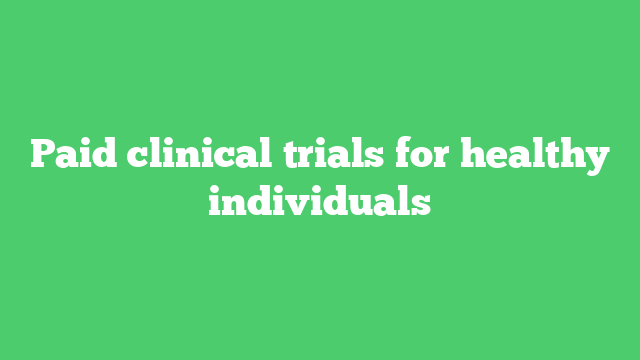Clinical trials are integral to the field of medical research, constituting the launching pad for advancements in healthcare. At its core, a clinical trial is a voluntary research study conducted in people and aimed at evaluating a medical, surgical, or behavioral intervention. The fundamental goal of these trials is to determine the safety and efficacy of new drugs, medical devices, or treatment regimens, or to investigate novel applications of existing medical interventions.
A clinical trial follows a precise and pre-defined plan, known as a protocol, which lays down the rules a trial must adhere to. The process is categorized into distinct phases, each with specific objectives and criteria – from phase I, which involves initial testing in a small group of people, to phase IV, which occurs after a drug or device has been licensed and brought to market. Throughout the trial, researchers meticulously record and analyze the data, eventually employing those findings to influence future patient care.
Identifying the Role of Healthy Participants in Clinical Trials
When exploring the multifaceted process of clinical trials, the significance of the role of healthy participants often emerges as a cornerstone to drug and treatment vetting. Most people perceive clinical trials as solely a method for individuals with particular ailments to seek experimental treatments. Still, individuals in good health are crucial to this complex process. Their participation helps researchers understand the preventative, diagnostic, and therapeutic aspects of multiple conditions under a lens that offers a comparative view, allowing them to study the reactions in healthy bodies as opposed to those battling diseases.
Healthy participants, therefore, provide researchers with fundamental baseline data. From the onset of symptoms to the reactions to doses of drugs, the information from healthy individuals is diverse and vital for research. Their participation tells researchers how the human body should typically react, thus enabling easier identification of any anomalies or side-effects caused by the treatment or drug being tested. Moreover, healthy participants can aid the development of a wider range of health innovations transcending typical disease treatments, including new diagnostic tools, preventative strategies, and even methods for improving the quality of life.
The Process of Participation: What to Expect
Participating in a clinical trial is a process steeped in both science and stringent protocols meant to ensure the safety and wellbeing of every participant. Initially, participants are given thorough information regarding the trial including its purpose, the interventions involved, the potential risks and benefits, and the crucial role of their participation in widening the horizons of medical knowledge. This is known as the informed consent process. To signify understanding and willingness to participate, individuals must sign a consent form, although it’s equally important to note that this in no way relinquishes a participant’s right to withdraw at any point during the trial.
Subsequent to the consent process, participants generally go through baseline screening assessments to establish their health status before the intervention begins. The nature and duration of the intervention can vary widely depending on the study, from taking medications, to trying new medical devices, to participating in lifestyle or counseling sessions. It’s crucial for participants to faithfully follow the trial protocols for the duration of their participation as this ensures the integrity of the study. Regular follow-up appointments are scheduled for monitoring the effects of the intervention and the overall health of the participant. The data collected throughout these stages is invaluable in determining the success and safety of the medical innovation being studied.
Key Benefits of Participating in Clinical Trials
Participation in clinical trials offers several significant benefits. For patients grappling with illness or disease, these trials provide access to pioneering treatments and therapies that may not yet be commercially available. This can become a lifeline for individuals whose condition remains unchanged or worsens despite standard treatments. It promises the potential for improved health outcomes and lends vital support to the continuous advancement of medical science.
Not just for sick individuals, even healthy persons can glean considerable benefits from participating in clinical trials. These individuals gain the comfort of comprehensive medical examinations and ongoing health monitoring during their involvement in the trial. These benefits extend beyond personal gains; participating in clinical trials is also a valuable contribution to future generations. It paves the road to the exciting discovery of new treatments that may drastically improve or even save lives down the road.
Potential Risks and Drawbacks to Consider
While clinical trials offer several benefits, it is crucial to acknowledge the potential risks and drawbacks linked to participating in these studies. These vary greatly depending on the particular trial, with factors like the stage of the study, the type of intervention, and the health of the participant playing a significant role. In some instances, participants may experience side effects from the treatment under investigation or a placebo, which can range from mild discomfort to severe complications. Also, the trial’s protocol might necessitate frequent visits to the study site, which can lead to significant time commitment and potential expense.
Furthermore, participation in a clinical trial doesn’t always guarantee personal benefit. The treatment or procedure being tested might not be better than the standard or existing treatments. There is also a possibility that the participant may receive the placebo instead of the trial treatment. In addition, participant’s confidentiality could be compromised as personal health information is collected during these trials. Therefore, it is crucial for prospective participants to thoroughly discuss these potential risks and drawbacks with their healthcare provider or the research team prior to participation.
The Selection Criteria for Healthy Participants
In clinical trials, the selection criteria for healthy participants can vary considerably, depending largely on the specific nature of the trial and the needs of the investigators. Common requirements that tend to span across most trials include being a non-smoker, not taking any medication or only certain types, having a specific range of body mass index (BMI), and being free from any chronic or serious health conditions. Additionally, factors such as age, gender, diet, and lifestyle may also come into play. All of this is meticulously determined beforehand and those who do not meet these initial criteria are usually excluded from further consideration.
Beyond physical health, psychological well-being plays a crucial role as well. Participants need to be mentally prepared to follow strict schedules, adhere to protocol, and endure potential side effects. Researchers also look for individuals who understand the aim and the process of the trial, willingly accept the associated risks, and are ready to commit for the entire duration of the study. This comprehensive selection process ensures that the pool of participants is an appropriate fit for the specific objectives and requirements of the clinical trial in question, and reduces the risk of complications or dropouts during the course of the study.
How Compensation Works in Clinical Trials
Clinical trials often offer compensation to participants, though the exact amount can vary based on several factors. The nature of the trial, the time involved, and the potential risks or discomforts that might be associated with the trial will often play a large role in determining compensation. Some trials may only offer a minor stipend, primarily meant to cover expenses related to travelling for appointments or potential loss of time from work. Furthermore, pharmaceutical companies and research organizations pay these compensations as a token of appreciation to participants.
In contrast, some clinical trials might offer significant amounts of compensation, especially for trials that involve invasive procedures or carry potentially high levels of risk. The ethics committees of clinical trials review and approve the scale of payments made to trial participants, ensuring they are fair and appropriate. The compensation is not intended to persuade individuals to undertake undue risks, but it rather aims to reimburse them for their time, efforts and any related expenses. While the prospect of payment can be attractive, potential participants are always advised to balance this against the commitment involved and the possible medical risks. The transparency and fairness in the process are essential to maintaining the integrity and ethical standards of clinical research.
Rights and Protections for Clinical Trial Participants
The principles underlying the rights and protections of clinical trial participants are grounded in ethical considerations and enforced legally to ensure the safety and well-being of the individuals involved. These tenets are internationally upheld and promulgated by relevant guidelines such as the Good Clinical Practice (GCP) and the Declaration of Helsinki. Key elements of these protections include informed consent, respect for personal privacy, the right to withdraw from the study at any time without facing any consequences, and the assurance that the participant’s best interests are always prioritized.
In the context of informed consent, participants must be provided with a comprehensive understanding of the trial, including its purpose, duration, procedures involved, any potential benefits or risks, and the extent of their involvement. This information allows them to make an educated decision about whether or not they wish to partake in the trial. The privacy and confidentiality of the participants are strictly maintained, preventing any misuse of their personal or medical data. Hence, participants can expect a high level of protection and security while partaking in clinical trials.
Exploring Different Types of Clinical Trials
Clinical Trials can broadly be divided into two primary types: observational and interventional. Observational trials allow researchers to study diseases or conditions in their natural settings. The participants aren’t given any special interventions, instead, scientists observe them over time to draw conclusions about the condition. On the other hand, interventional trials involve providing participants with some form of intervention like a new drug, a surgical procedure, or even a lifestyle change, and then observing the effects on the participants’ health.
Interventional trials are further sub-divided into randomized controlled trials (RCTs), crossover trials, and factorial trials, among others. In RCTs, participants are arbitrarily assigned to either the experimental group or the control group, minimizing biases. Crossover trials empower each participant to serve as their own control as they receive both the experimental and control treatments at different times. Notably, factorial trials are designed to assess multiple interventions in only one trial, helping to explore the combined effect. The type of trial conducted usually hinges on the nature and scope of the research question and the phase of trial.
How to Find and Apply for Clinical Trials
Finding suitable clinical trials to participate in can seem like a daunting task initially, but a well-informed approach can simplify this process. An important first step would be to consult with healthcare professionals or research coordinators who can provide valuable insights into ongoing or upcoming clinical trials.
Once you identify a trial that aligns with your interests, applying to be a part of it commences. This typically involves a detailed understanding and signing of an informed consent document that explains the study’s objective, the procedures to be followed, potential risks and benefits, and your rights as a participant. Post this, a careful screening or selection process takes place to ascertain whether you meet the trial’s inclusion criteria. Remember, prompt communication and honesty regarding your health status can increase the chances of your successful enrolment in a clinical trial.




